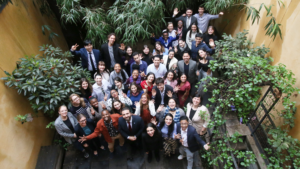Want to know how we’re representing YOU at the UN? Read on!
 Last week we told you about the Commission for Social Development, but that’s not the only commission we go to. There are two more major commissions this season, and we’ll be there advocating for human dignity. Here’s how we do that.
Last week we told you about the Commission for Social Development, but that’s not the only commission we go to. There are two more major commissions this season, and we’ll be there advocating for human dignity. Here’s how we do that.
What commissions does WYA go to?
WYA goes to 3 major commissions each year. These are the Commission for Social Development (CSocD), the Commission on the Status of Women (CSW), and the Commission on Population and Development (CPD). They’re part of the Economic and Social Council (ECOSOC), a major branch of the UN. Since getting accreditation in 2015, FEMM, WYA’s sister organization, has also been attending the commissions.
How does WYA represent me at the Commission?
WYA started preparing to represent you at the Commissions back in October. That’s when the first written statements are due each year. We also apply to give oral statements during the Commissions and attend a lot of meetings. Perhaps most importantly, we work with Member States to help them defend human dignity when they’re negotiating declarations. Want to see how we’re representing you? WYA and FEMM’s written statements for CPD just got published on the Commission’s webpage—check them out by clicking on agenda item 3. You can also see our CSW statements here, and our CSocD statements here.
What is a commission anyway?
A commission is a group of Member States (countries that are part of the UN) that hold meetings around a particular topic. They choose themes related to that topic to discuss each year. In general, any Member State can participate by attending meetings or making a statement, but officially only some are actually members of the commission. Each region has a set number of membership spots and each member usually sits on the commission for two years.
Do the commissions really matter?
 Yes! The UN can seem pretty far removed from daily life, but the priorities they set at these commissions can have big effects on local policies and priorities. If you’ve done any advocacy training with WYA, you might remember the policy cycle. We want to help Member States focus on what people really need, rather than promote controversial ideas. It’s kind of like a little pink flyer moment each time. We’re proud to represent each of WYA’s over 200,000 members at these meetings. Wish us luck!
Yes! The UN can seem pretty far removed from daily life, but the priorities they set at these commissions can have big effects on local policies and priorities. If you’ve done any advocacy training with WYA, you might remember the policy cycle. We want to help Member States focus on what people really need, rather than promote controversial ideas. It’s kind of like a little pink flyer moment each time. We’re proud to represent each of WYA’s over 200,000 members at these meetings. Wish us luck!








